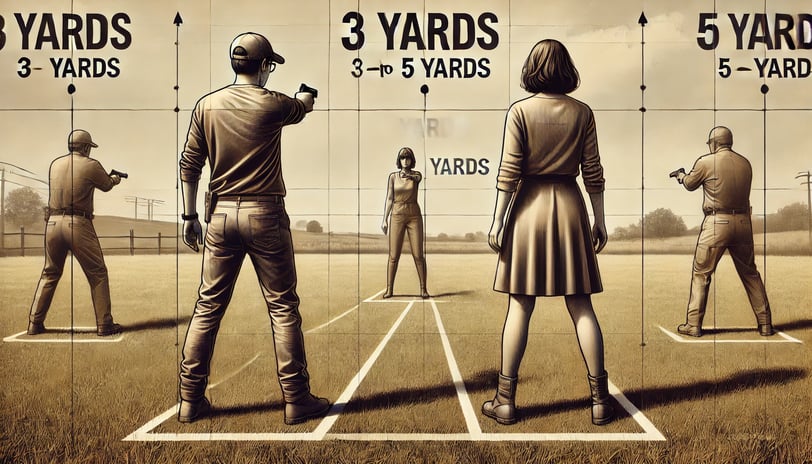Why You Need to Train for the 3-to-5 Yard Problem Resolution
When it comes to defensive shootings, data from Tom Givens of Rangemaster Firearms Training and author of Concealed Carry Class provides crucial insights and may be one of the few sources for “normal people” exchange of gun fire and the distance the incident took place. With decades of teaching and a database of 67 real-life student-involved shootings, his findings offer a clear picture of what self-defense scenarios look like over his study period—and why training matters.
Here’s what we know:
👉 87% of incidents occurred between 3 and 5 yards – the “danger zone” where most civilian self-defense shootings take place in this source of information.
👉 4% were at 0 to 2 yards – involving extreme close contact.
👉 4% occurred at 5 to 7 yards, and another 4% at longer ranges of 15 to 25 yards.
The takeaway? Most attackers will start threatening from a “safe” distance, beyond your personal space. Once they think you’ll comply, they move in closer.
What’s remarkable is that 64 out of 67 students who fought back survived. These students weren’t random individuals—they had taken at least one solid training class (8 hours). Their survival wasn’t luck; it was preparation. It’s unfortunate to mention that the 3 students that fought back who were killed, were not armed at the time of the incident, but did indeed make an attempt to fight.
What About Untrained Individuals?
Without training, people may hesitate to react, giving attackers the upper hand in close-contact situations. Training helps you develop the skills to act decisively, particularly in the critical 3-to-5-yard range. Your survivability also increases the other lives around you a great chance to go home to their families as well.
Sights vs. Speed: What Works Best?
At this range, you might question whether sights are truly useful or if reaction time even allows for their use. The data makes it clear: prioritizing fast, accurate responses is critical. Mastering the balance between speed and sight usage can be the difference between success and failure.
That’s exactly why our training is designed to target these key areas, providing practical methods to measure your success and ensure continuous growth.
What’s Next?
The stats don’t lie: training saves lives. And while scenarios may vary, being prepared for that 3-to-5-yard encounter is non-negotiable.
Our training programs focus on realistic, data-driven tactics to prepare you for exactly these kinds of situations. Don’t leave your safety to chance. Take action, sharpen your skills, and build the confidence you need to protect yourself and your loved ones.
💥 Ready to start? Join our membership today.
Training Saves Lives!

